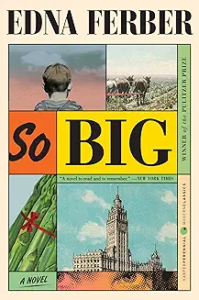So Big by Edna Ferber 1925
Edna Ferber (1885-1968) won the Pulitzer Prize for Fiction in 1925 with “So Big”. It was her fourth novel, and she went on to write eight more plus a dozen short story collections and several plays. She is perhaps best known for the theater and movie adaptations of her novels, “Giant”, “Showboat” and “Cimarron”. I knew her primarily as the author of “Giant” made into a movie in 1956 starring Elizabeth Taylor, Rock Hudson, and James Dean. It was nominated for 10 Academy Awards and won the Oscar for Best Director, George Stevens.
While I liked this novel, the best part of reading it was learning about the author, a fascinating woman. Born in Kalamazoo, Michigan to Jewish parents, she moved with her family throughout the Midwest including stints in Chicago (which featured prominently in “So Big”), Iowa (where she experienced virulent anti-semitism) and finally Appleton, Wisconsin where she attended Lawrence University. Chicago where I grew up and Appleton where I disembarked from the train for summer camp for 8 years held particular meaning for me.
Ferber never married and did not appear to have any significant partners during her life. She was a member of the Algonquin Round Table and collaborated with another member, George S. Kaufman to co-write several successful Broadway plays the best known of which is “Stage Door”.
“So Big” is a big novel. In the first chapter we meet Selina Peake, orphaned at 19 when her gambler father is shot at a poker game by a woman aiming at another player at the table. We also meet Selina’s 2 year old son, Dirk who is nicknamed “Sobig” because of his response to the classic parental question: “How big is Dirk?”. After that intial chapter, we start with Seline’s father’s death after which she takes a job as a teacher in a Dutch farming community, High Prairie, southwest of Chicago, marries a Dutch farmer, gives birth to her son, and becomes the farthest thing from what she had imagined, a hard scrabbling farmer’s wife. When her husband dies after 10 years on the farm, Seline picks up her skirts and does the man’s work in order to send her son to college. Dirk becomes an architect but abandons it after WWI and goes into bond trading, boosted by his mother’s childhood friend’s daughter.
Sound complicated? Not really, because Ferber really knew how to tell a story, pacing it just right and adding enough twists and turns to keep the reader going. I was, however, disappointed as the novel wound down and Ferber appeared to be confused about how to end it. Despite that, this was a good, old-fashioned novel full of big characters and interesting action. Seline Peake and the graphic artist, Dallas O’Mara are two characters that I will long remember. Hard to imagine this book winning a Pulitzer today given its rather old fashioned style, but not surprised it was a hit 100 years ago.



